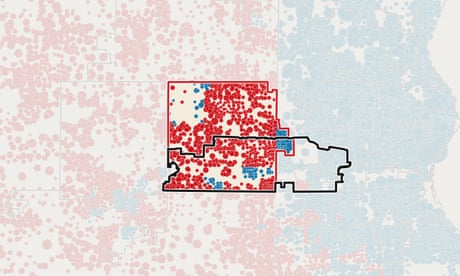- by foxnews
- 12 Mar 2025
‘We’re at risk’: the little-known races that could expand Republican power
‘We’re at risk’: the little-known races that could expand Republican power
- by theguardian
- 08 Nov 2022
- in news

Eva Burch has worn out her shoes visiting thousands of voters this year.
Burch, a Democrat running for the Arizona state senate, tells people that her race could be decided by just a few hundred votes. She's not just "cat-mousing them" - the race really could be that close. And while her race has gotten nowhere near the amount of attention of Arizona's closely watched US Senate and gubernatorial races, it could ultimately be just as important.
The battle for control of the Arizona senate runs through this competitive district in suburban Mesa, once a Republican stronghold. Republicans currently have a one-seat majority in both of the state legislative chambers, and Democrats are hoping they can at least work Republicans to a tie.
Burch's race is one of several under-the-radar contests that will determine who controls legislative chambers, responsible for enacting state laws, across the US. Those races increasingly have profound consequences for American democracy. In 2020, Donald Trump and allies turned to state legislatures as a key part of his effort to overturn the election and could do so again in 2024. The US supreme court could also endorse a novel legal theory next year that gives state legislatures significantly more power over setting rules for federal elections.
It's not just elections. With Washington deadlocked, state legislatures are also increasingly playing a powerful role in driving decisions around voting access, abortion, education and gun rights.
"One of the best and worst parts of state legislatures is, the things that they're making decisions on directly affect people's lives in a way that Congress sometimes doesn't," said Amanda Litman, a co-founder of Run for Something, which focuses on down-ballot races.
This year, Democrats are at a disadvantage - Republicans control 30 state legislatures, while Democrats control only 17. State lawmakers in many states are responsible for drawing district lines. Those Republican majorities gave state lawmakers power to draw advantageous districts and lock in their majorities for the next decade, essentially allowing lawmakers to pick the voters they represent.
Beyond Arizona, the most promising opportunity for Democrats to flip a chamber is in Michigan, where control of the state senate is up for grabs. That would give Democrats a critical legislative presence in a state where Trump sought to overturn the election.
There are also competitive races for chamber control in Minnesota, Maine, Alaska, Nevada, Washington and Oregon - in some of which Democrats are defending their majorities. Republicans could pick up around 200 state legislative seats this cycle, said Chaz Nuttycombe, who runs cnAnalysis.com, a website that forecasts state legislative elections.
"The Democratic party is going to be in the worst spot they're in in state legislatures in 100 years," he said. "The Democratic party, especially since the 2010 midterm, has largely focused on the nationalization of politics, more national elections, more so focusing on Congress, rather than going from a bottom-up effort as the Republicans have."
"It is nearly impossible in a sentence to explain the broad-reaching power of state legislatures and the implications for voting, legislative majorities, the presidential election and the policies that get headlines," said Daniel Squadron, a co-founder of the States Project, a Democratic-aligned Super Pac that is spending $60m on state legislative races this year. "It's really important to say that this conversation would have felt like enormous progress on acknowledging this issue 10 years ago or even five years ago. But acknowledging that there's a mountain isn't the same thing as climbing it."
"We've said from the start that our number one priority this year is defending our razor-thin majorities in states like Arizona, Michigan and New Hampshire, as doing so will make this the first two-year cycle since 2013-2014 Republicans net legislative chambers," Andrew Romeo, a spokesman for the Republican state leadership committee, which works on state legislative races, said in a statement.
In Wisconsin, Democrats don't have a chance of flipping the state legislature, but there's a hugely consequential battle brewing anyway.
If Republicans are able to flip just six seats - five in the state assembly and one in the state senate - they'll get a supermajority, which will enable them to override any kind of veto from the Democratic governor, Tony Evers, who is locked in a tough re-election battle. That would essentially give Republicans the authority to pass whatever laws they want, even if the governor is a Democrat.
It's an augmentation of an advantage Republicans have enjoyed in the state since 2011, when they drew old district lines. The lines for the state assembly, considered by many to be the most gerrymandered - distorted to favor one party - in the US, ensured Republicans controlled at least 60 of the chamber's 99 seats, even as Democrats won statewide. When they redrew the maps this year, aided by a few court rulings, they went even further. They now have essentially a toss-up chance of getting a supermajority, according to cnalysis.com.
They targeted districts like the one Sarah Harrison, a Democrat, is running in in the Milwaukee suburbs. In 2020, a Democrat broke through the GOP gerrymander and flipped the district by 735 votes. When Republicans redrew the maps, they moved the lines to make it more Republican, making it much harder for Harrison to win. She's not favored to beat her Republican opponent.
When she knocks on doors, Harrison sometimes brings up a version of the old and new maps on her phone to show voters. She calls the old one "the gerrymandered map" and the new one "the extra gerrymandered map".
"It's wild that we are essentially a 50-50 state, but we're at risk of getting a supermajority in both of our houses. In the senate and in the assembly. I mean, you gotta do some pretty creative map-drawing to get to that point," Harrison said. "If the Republicans are able to get into a supermajority, then we lose the power of Tony Evers' veto pen. And Tony's pen has saved us from a lot of bad legislation over the last four years."
The long odds in her race have also made it more difficult to convince donors that they should support her. "Democrats have so many things right now that they need to fund. You have so much to go around and they have to make the right strategic decisions," Harrison said. "And if you just look at my district and look at the numbers, it doesn't look great. I firmly believe that it's winnable and I am out there fighting for every vote I can get."
Litman, of Run for Something, expects Democrats to have a tough year.
Changing the makeup of legislatures is a long game that requires financial and grassroots investment in thousands of individual races. Democrats "missed the boat" more than a decade ago and have been fighting to both keep the states they have and try to expand their maps. Donors don't always want to fund lower-ticket races either, she said.
The Democratic legislative campaign committee, a Democratic group focused on state legislatures, has been spending much more in legislative races in recent years, the group's president, Jessica Post, said. In 2016, the group was spending about $16m (�14m) an election cycle, compared to more than $50m (�44m) now, she said. Still, those numbers can be eclipsed by a single high-dollar race for US Senate or governor some years.
Republicans have long understood the power of state legislatures, she said. They have built power in statehouses over time, and with a conservative US supreme court that's more inclined to pass power back to states, they are in a position to use that power even more.
"State legislatures are the building blocks of democracy," Post said. "They control much more of what affects your day-to-day life than any other level of the ballot. I think as Democrats, we often think the federal government's going to come in to save us. And really, the Republicans understand the source of power is the state legislatures."
On a cloudy Thursday morning, just a few days ahead of election day, Burch continued knocking on doors reminding voters to drop off their ballots.
One voter, recognizing her, answered the door with an enthusiastic "We're excited to vote for you." The nurse practitioner and first-time candidate handed voters a piece of campaign literature, telling them to contact her on her website with anything they may need or have questions on. She'd call them back. She'd meet with them.
"You don't have to make an appointment and go down to Phoenix to talk to me," she told them.
- by travelandtourworld
- descember 09, 2016
Sandals Resorts Brings Caribbean Vibes to New York with Exclusive ‘Made of Caribbean' Event
Last night, Sandals Resorts, the Caribbean’s most awarded all-inclusive brand, launched its new global campaign, Made of Caribbean, at an exclusive event in New York City. The star-studded celebration gathered an impressive array of travel industry leaders, media, celebrities, dignitaries, influencers, and VIPs from the worlds of music, fashion, and entertainment.
read more


